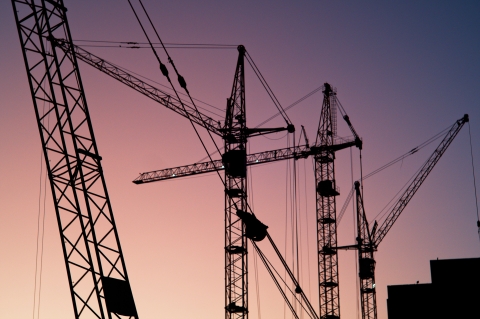

Tower cranes come in many different sizes, and many weigh more than 100 tonnes.
How does a crane go up and down? – Spencer, aged four, UK
When you see the metal arms of a crane – known properly as a tower crane – against the skyline, you know a new building is going up in your city or town.
Many of the materials and machines on a big building site are too heavy for people to lift by themselves without getting hurt. Using a tower crane means that building materials can be lifted easily and quickly, even when something very tall is being built, such as a skyscraper.
Tower cranes are huge. They are transported to a building site in many separate small sections and put together on site, almost like a Lego kit.
In order to lift heavy things like concrete, tower cranes themselves must be very strong, so they are made from steel. Tower cranes come in many different sizes and many weigh more than 100 tonnes. They can carry up to around 18 tonnes – about the weight of 12 cars.
Building the crane
Before the tower crane can be put up, a strong foundation is normally built out of concrete and steel. This means that the ground below will not collapse when the crane is lifting heavy materials.
When the foundation is ready, the bottom section of the tower is lifted by another crane (usually one attached to the top of a truck) and fixed on it. The other sections of the tower are then lifted and stacked on top of each other. Each section of the tower has a ladder inside it, so that the people building the crane can climb up and bolt the sections together.
Once the last section of the main tower is lifted and fixed, a big metal ring that can spin around is attached on top of it. There’s a driver up at the top of the crane and they sit in a cabin fixed to the side of this ring. This means that the driver has a good view of everywhere around the crane, because the cabin can move around in a circle.
A steel frame which becomes the highest part of the tower crane is then lifted and fixed directly on top of the rotating ring.
Then, the bit of the crane which sticks out horizontally – the lifting arm – can be attached. It is connected to the rotating ring and tied to the highest steel frame of the tower with big, strong wire ropes.
The lifting arm also comes in sections which are connected together by strong bolts. In order to put these sections together safely, fitters wear harnesses tied to a stable point to ensure that they don’t fall from the heights they are working at.
Before the crane can be used, engineers check to make sure it is fixed and working perfectly. When the tower crane is in use, engineers also keep an eye on the weather. Sometimes the crane can’t be used when the wind is too strong, because it might fall over.
The crane is ready to work. To balance the weight of the lifting arm when it is carrying things, some heavy weights made out of concrete are lifted and placed on the opposite side.
In order to lift things, a wire rope with a hook is connected to the lifting arm. By pulling or lowering this rope, things on the building site can be lifted or lowered – and the new skyscraper in your town can be built.
Kenneth Awinda is a Senior lecturer at the School of Civil Engineering and Surveying in the Faculty of Technology.
This article is republished from The Conversation under a Creative Commons Licence. Read the original article.
More The Conversation Articles...
The Conversation is an independent source of news analysis and informed comment written by academic experts, working with professional journalists who help share their knowledge with the world.
Only Murders in the Building is a loving parody of the whodunit
Christopher Pittard
30 August 2023
4 min read

The Lionesses had a terrific World Cup, but women’s football in England is on shaky economic ground – new research
Christina Philippou
29 August 2023
4 min read

After months of negotiations Ukraine will be getting the F-16 warplanes it has been begging for – here’s why that’s important
Matthew Powell
25 August 2023
4 min read

